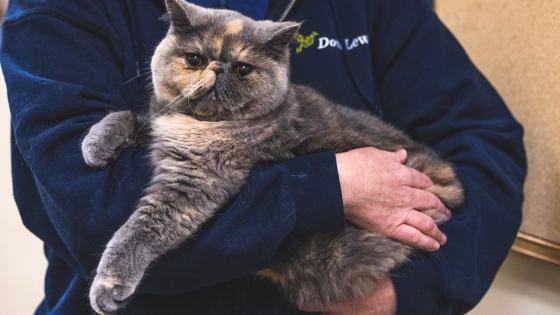Afi’s Close Call: A Reminder About the Dangers of Xylitol for Pets
Afi is a sweet 6-year-old pup living his best life in Portland—splitting his time between cozy naps inside and joyful adventures with his family. But recently, Afi faced a sudden and serious health scare that every pet owner should know about: xylitol toxicity.
When Something Felt Off
One evening, Afi got into a pack of sugar-free gum—35 pieces in total. It wasn’t long before he started vomiting and turning down food, which raised alarms. Afi is usually all about mealtime, so something was clearly wrong.
They brought him straight to the ER at DoveLewis.
 The Risk Behind a Seemingly Small Snack
The Risk Behind a Seemingly Small Snack
Xylitol is a sugar substitute found in many common items like gum, candies, mints, baked goods, and even some peanut butters. It’s completely safe for people, but dangerously toxic for dogs. Ingesting even small amounts can cause a rapid drop in blood sugar, liver damage, or worse.
When Afi arrived at the hospital, our team immediately began monitoring him for signs of hypoglycemia (low blood sugar) and liver failure—two serious effects of xylitol toxicity. His bloodwork showed sky-high liver values, pointing to intense liver stress. He was started on IV fluids, liver-protective medications, and anti-nausea treatment right away.
A Careful Recovery
Afi stayed under close observation for a couple of days. Every hour mattered as his liver function was tracked and his condition monitored. Thankfully, Afi began to improve. He was eventually discharged with a detailed care plan and instructions for continued monitoring at home.
What You Should Know About Xylitol
Xylitol is fast-acting and incredibly dangerous for pets, especially dogs. Here's what every pet owner should keep in mind:
- Read Labels: Xylitol can be found in sugar-free gum, mints, candy, some peanut butters, toothpaste, baked goods, and even vitamins or supplements.
- Act Fast: If you think your pet might’ve eaten something with xylitol, don’t wait. Call your vet or DoveLewis right away, even if your pet seems fine.
- Watch for Symptoms: Vomiting, weakness, loss of coordination, lethargy, or refusal to eat can be early signs of xylitol poisoning.
- Keep It Out of Reach: Preventing access is key. Store all xylitol-containing products in secure locations, far from curious paws.
While xylitol poisoning is most common and most dangerous in dogs, it can also pose a risk to cats—especially the potential for liver damage—so it’s safest to keep any xylitol-containing products out of reach of all pets.
Afi’s Story is a Reminder
Something as common as a pack of gum can turn into a medical emergency. Afi's story is a reminder of how quickly things can change—and how important it is to know the risks, recognize the signs, and act fast when something feels off. Because when it comes to the pets we love, there’s no such thing as being too careful.



